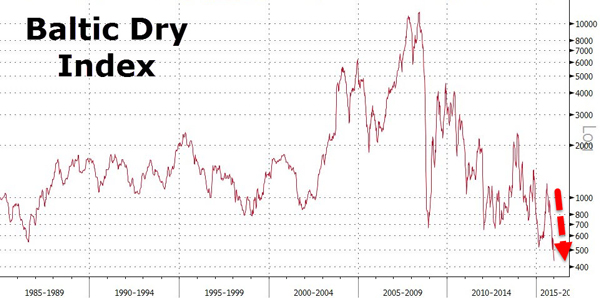Global depression around the corner? Ship cargo rates at all-time low

The indications
- The Baltic Dry Index is an average of rates paid for moving raw materials by ship
- It hit an all-time low of 383 points on 14 January
- It used to be above the 10,000 mark before the 2008 recession, and at 1,222 points three months ago
The meaning
- The BDI can fall for two reasons: a reduced demand for ships, or lower international trade
- A short-term fall can only be for the latter reason because the supply of ships can\'t be increased quickly
- Because BDI is for raw materials, this is an indication of lower production in the future
The global economy appears to be in danger. The Baltic Dry Index, an indicator of international cargo trade, has fallen to its all-time low.
In the past, the index is notorious for falling ahead of some of the biggest economic depressions - including the dot com bust in 2000 and the great recession of 2008.
So, what does its latest fall tell us?
Also read - China unleashes a bear: stock market crash a risk & an opportunity for India
What is the BDI?
The Baltic Dry Index is an average of rates paid for moving bulk cargo like coal, cement, metal ore, fertiliser and grains by sea. This does not include crude oil.
The rates are for high-volume trade routes, and submitted daily by shipbrokers to the London-based Baltic Exchange. These values are combined to calculate the BDI on every working day.
Broadly, the BDI can fall for two reasons: a reduced demand for ships, or lower international trade. But a short term fall can only be for the latter reason, because the supply of ships cannot increase suddenly - it takes at least two years to build new ones.
Because these dry goods are raw materials, the demand for transporting them is an indicator of how much production is planned for the future. This gives clues about economic growth in the future.
The Baltic Dry Index is an average of rates paid for transporting raw materials by sea
Besides, 90% of international trade happens by sea, so a fall in this is not a good sign for the world economy.
The BDI is taken seriously because there is not much speculation in shipping orders. All the contracts are for moving actual goods, and not to simply bet on a rise or fall in the rates. This gives the BDI the credibility of showing changes in the 'real' economy, as opposed to the financial markets, where short-term changes usually have no links with actual material changes in an economy.
The downward spiral

Credit: ZERO HEDGE
On 13 January, the index fell to its lowest ever mark, 394 points. Then, on 14 January, it slipped further to 383 points.
Contrast this with August 2015, when the index was at 1,222. Before the 2008 recession, it was over 10,000. Since 1 January itself, the index has lost almost one-fifth of its value.
The BDI, in the last five years, has seen a common trend - it declines in January from a peak reached in September or October the previous year. While this pattern has continued this year, the peak was much lower, and as a result, the January fall has taken the index to its lowest point ever.
Reasons for the fall
According to several reports, one reason for the BDI fall is a virtual collapse of cargo trade in the north Atlantic Ocean. On 8 January, there were absolutely no cargo carriers plying in the ocean, and large shipping companies are reportedly anchoring their ships, as they are otherwise running on a loss.
This means industrialists are willing to pay lower amounts for transporting their raw material cargo by sea, which is likely a result of a slowdown in the global economy. As consumers are buying less and industries are producing less, the demand for raw materials is lower, and this slowdown has finally reached the transporters.
An analysis by the popular financial blog ZeroHedge quotes data on inventory versus sales in the US. The ratio of inventory to sales shows how much retailers have kept in their stock for every dollar worth of goods sold.
Broadly, the BDI can fall for two reasons: a reduced demand for ships or lower international trade
In a buzzing economy, the two would be comparable, and the inventory may even be lower than sales, meaning the ratio is low.
But in reality, this ratio has been climbing. And it is now at a high not seen since the 2008 recession.
Sense of foreboding
So is the BDI signalling an oncoming depression? The jury is still out on that. While an economic depression causes a fall in the BDI, the vice-versa is not always the case, said the India executive director of a major finance and accounting consultancy.
"For the BDI to fall due to an economic slowdown, it means that transactions on long-haul ships are getting cancelled. Otherwise, a decline in the BDI can be because of demand disruptions," the official, who requested anonymity, said.
There has been a spate of bad news from China, whose economy relies on nearly $4 trillion worth of imports and exports. In 2015, its imports dropped by 13% and exports fell by about 2%. The import of coal and iron ore - both components of the BDI - fell for the first time in over a decade. There is also a slowdown in steel production. The Chinese export slump is likely because of weak demand from the US and European nations.
Global commodity prices have also been falling, squeezing money out of mining firms. Copper prices are at multi-year lows, as are aluminium, zinc, and tin, and also agricultural commodities like wheat, corn and soyabean.
It may be too early to call it the sign of an upcoming depression - but these hardly seem like mere demand disruptions.
More in Catch - China's economy witnesses major slump in growth at 6.3%
Forget the #SensexCrash: China's crisis may actually be good for India
First published: 16 January 2016, 12:52 IST






![BJP's Kapil Mishra recreates Shankar Mahadevan’s ‘Breathless’ song to highlight Delhi pollution [WATCH] BJP's Kapil Mishra recreates Shankar Mahadevan’s ‘Breathless’ song to highlight Delhi pollution [WATCH]](https://images.catchnews.com/upload/2022/11/03/kapil-mishra_240884_300x172.png)

![Anupam Kher shares pictures of his toned body on 67th birthday [MUST SEE] Anupam Kher shares pictures of his toned body on 67th birthday [MUST SEE]](https://images.catchnews.com/upload/2022/03/07/Anupam_kher_231145_300x172.jpg)






